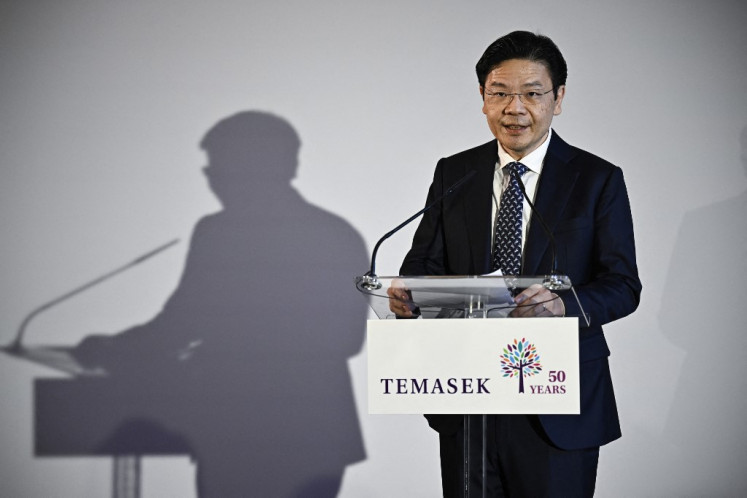Offering Google a much-needed Bahasa boost
On the go: A person prepares to search the Internet using the Google search engine
Change Size
 On the go:: A person prepares to search the Internet using the Google search engine. AFP/Philippe Huguen)
On the go:: A person prepares to search the Internet using the Google search engine. AFP/Philippe Huguen)
On the go: A person prepares to search the Internet using the Google search engine. (AFP/Philippe Huguen)
The popularity of Google is hard to deny, with its search engine earning the nickname 'Mbah Google' for helping people find answers to life's pressing questions, whether tough or simple one like which restaurant to take a date to.
However, Google says that users can aid the digital Mbah, or sage, in providing answers by simply playing a more active role in providing content, especially in Bahasa Indonesia.
'Based on our indexes, the percentage of all content available in Bahasa Indonesia on the Internet a year ago was less than 1 percent,' said Amy Kunrojpanya, Google's head of communications and public affairs for Indonesia and Greater Mekong.
Although the percentage of content available in Bahasa Indonesia has risen since then, the paucity of local language content means that Indonesian Internet users are still 'not represented the way they should be online'.
'For a [national] population and Internet population of this size, the people online using Bahasa as their primary language are under-represented,' she noted.
Indonesia has a population of 250 million people, of which 82 million, or equivalent to 33 percent, are Internet users, data from the Communications and Information Ministry shows.
The ministry added that this figure places Indonesia the eight-largest Internet population in the world.
Kunrojpanya further said that in order to reverse this under-representation, the country's Internet users needed to generate local content themselves.
'When one in three people are online, you will start to have a volume of people putting information out there and, likewise, people searching for that information. It is a supply and demand situation,' she added.
One way to boost beneficial, local content is by getting more small businesses to have an online presence, be it through a website, blog or even social page.
'So many small businesses are not represented online when, in fact, they are the backbone of every country,' Kunrojpanya pointed out.
Indonesia's small and medium enterprises (SMEs) have consistently supplemented more than 50 percent of the country's gross domestic product (GDP), thereby bolstering the economy from global crises.
'When the Internet population reaches over 30 percent, you will start to see a link between the information put out there and the economy,' she added.
According to Kunrojpanya, once small businesses have an online presence, Google can pull all their information together and present it in the knowledge graph of its results page.
The knowledge graph is a panel of information sitting at the top of the results page. The graph presents key information regarding the searched query. If a user has entered the name of a café, for instance, then the panel will feature key information connected to the café, such as the address and telephone number.
Kunrojpanya added that putting out location-linked content had become increasingly significant as searches via mobile devices surged.
'The kinds of questions Internet users ask via mobile searches are instant, relevant and location-based, like looking for a restaurant or gas station,' she pointed out.
'Meanwhile, those using desktops have the luxury of time and, therefore, searches are longer in nature, with multiple questions asked and sources checked out,' she said.
She added that globally, 'Indonesia is on the higher side of mobile [searches] being an access point', considering the enhancements in smartphone penetration and mobile broadband infrastructure.
'That is what is unique about Indonesia. Other countries started searching on their desktops or PCs, but the young and fast-growing Indonesian Internet population of today is leapfrogging straight away to the mobile experience,' she said.
Data from eMarketer shows that cell phone Internet user penetration in Indonesia is estimated to hit 86.1 percent in 2014, rising to 90 percent in 2015.
Kunrojpanya added that users could also enhance their Google experience by sending feedback to Google via the feedback link available on their products.
'Taking 60 seconds to provide feedback can improve the experience for 60 million people. Indonesia is a really important market and it can, therefore, contribute to the world wide web experience,' she said.
She said Indonesian Internet users had become more sophisticated search users, as they were moving away from open query questions, such as 'look for sedan', to more specific questions by adding the brand and price range of the sedan.
'Indonesia is becoming a more sophisticated market because users are asking harder questions and queries,' she said, noting that in general, 25 percent of queries Google received were those that had never been previously asked.
She added that people had moved on from using Google just to obtain information, to having Google provide them with knowledge, suggestions and assistance in daily life.
She pointed out that the deeper use of Google's products also enabled Google to enhance those products by learning 'what works and not' for Indonesian users, including those who have started to utilize voice searches, which is now available in Bahasa Indonesia.
'The more Indonesians come online, no matter what device they are on, the more they can contribute to improving the experience in Bahasa Indonesia,' Kunrojpanya concluded.









